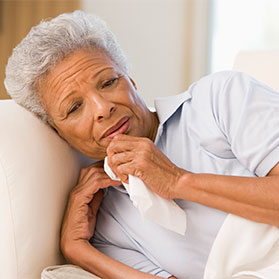- Community & News
- Service Line
Cancer in the Winter: Risk of Flu and Other Seasonal Illnesses

Wintertime brings elements that make everyone more susceptible to illnesses including the flu and common cold. Cancer patients who are already in a fragile state of health can use these tips to help prevent the risks of getting the flu and staying more healthy in these colder months.
Cancer Patients are at a Higher Risk
Because treatments like chemotherapy and radiation therapy weaken the immune system, if a cancer patient contracts influenza or the common cold, there is a higher risk of serious health complications and infection. It is harder to fight these illnesses, so there are a few things that cancer patients can do to avoid getting sick.
Get the Flu Shot
The first thing you can do is get the vaccine. You and all your family members (6-months and older) should get the flu shot as soon as it is available to lower the risk of getting the flu as the winter proceeds. Even if you have had cancer, but you do not have cancer now, you still need to take serious precautions against the flu. The inactivated vaccine is recommended for cancer patients and is given as a shot or injection. In some patients, getting the vaccine is not the best option. Be sure to talk to your doctor before getting the flu shot, including which flu shot you should receive.
Other Common Precautions
Germs spread the same way whether you have cancer or not. Be smart and use these common precautions to keep from getting the flu or other seasonal illnesses this winter.
- Don’t forget to wash your hands often: after you use the bathroom, before you treat any wounds, after hospital visits and doctor appointments, and after touching another person. Wash with soap and warm water or an alcohol-based sanitizer.
- Do not touch your eyes or nose and keep your fingers away from your mouth.
- Stay away from sick people or areas that have a high-concentration of germs, especially schools, daycares, and other places where germs are easily spread.
- Keep out of cold temperatures that may cause a higher risk of getting sick.
- Talk to your doctor about a vitamin D supplement.
- Be prepared with tissues, hand cleansers, medicines, and appropriate foods in case you do get sick, you will already have everything you need to take care of yourself. Talk to your doctor about what you should do in the chance that you do get sick.
- Stay home and limit your activities if you start to feel yourself getting sick. Contact your doctor.
Winter Skin
Skin gets dry, cracked, and itchy in the winter. Especially for patients undergoing radiation therapy, winter skin can be a huge discomfort. To treat winter skin:
- Wear protective winter clothing like hats, scarves, and gloves.
- Do not take long baths or showers. When you do bathe, do not use very hot water.
- Use skin sensitive soaps and detergents.
- Use lotion or moisturizer frequently on your body. For especially dry or cracked areas of your skin, consider applying Vaseline or a heavy moisturizer before you go to bed. Wear socks or gloves over your hands and feet to keep these more susceptible areas moisturized.
- Use lip balm. Be sure to use a lip balm with at least 15 SPF when you are outside in the sun.
- Avoid long periods of time in the sun. Sun exposure is even dangerous in the winter.
- Stay hydrated.
Other Seasonal Illnesses
The flu and cold are the most common illnesses in the winter. However, there are a few more serious illnesses that are prominent in the winter.
- Hypothermia is caused when the body cannot produce enough heat to stay warm. Be sure to regulate body temperature as best you can and to drink lots of water to avoid dehydration.
- Frostbite is caused when skin and underlying tissues freeze; skin becomes firm, waxy, and numb. To avoid frostbite, stay out of extremely cold temperatures. Be sure to wear layers and cover all areas of your skin with protective winter gear. Never stay in wet clothes.
American Cancer Society (ACS). Should I Get a Flu Shot? Accessed at http://www.cancer.org/treatment/treatmentsandsideeffects/physicalsideeffects/infectionsinpeoplewithcancer/seasonal-and-h1n1-flu-vaccine-information on November, 28, 2012.
Cancer.net. Cancer in the Winter Months. Accessed at http://www.cancer.org/treatment/treatmentsandsideeffects/physicalsideeffects/infectionsinpeoplewithcancer/seasonal-and-h1n1-flu-vaccine-information on November 28, 2012.
Related Articles
- Community & News
- Service Line